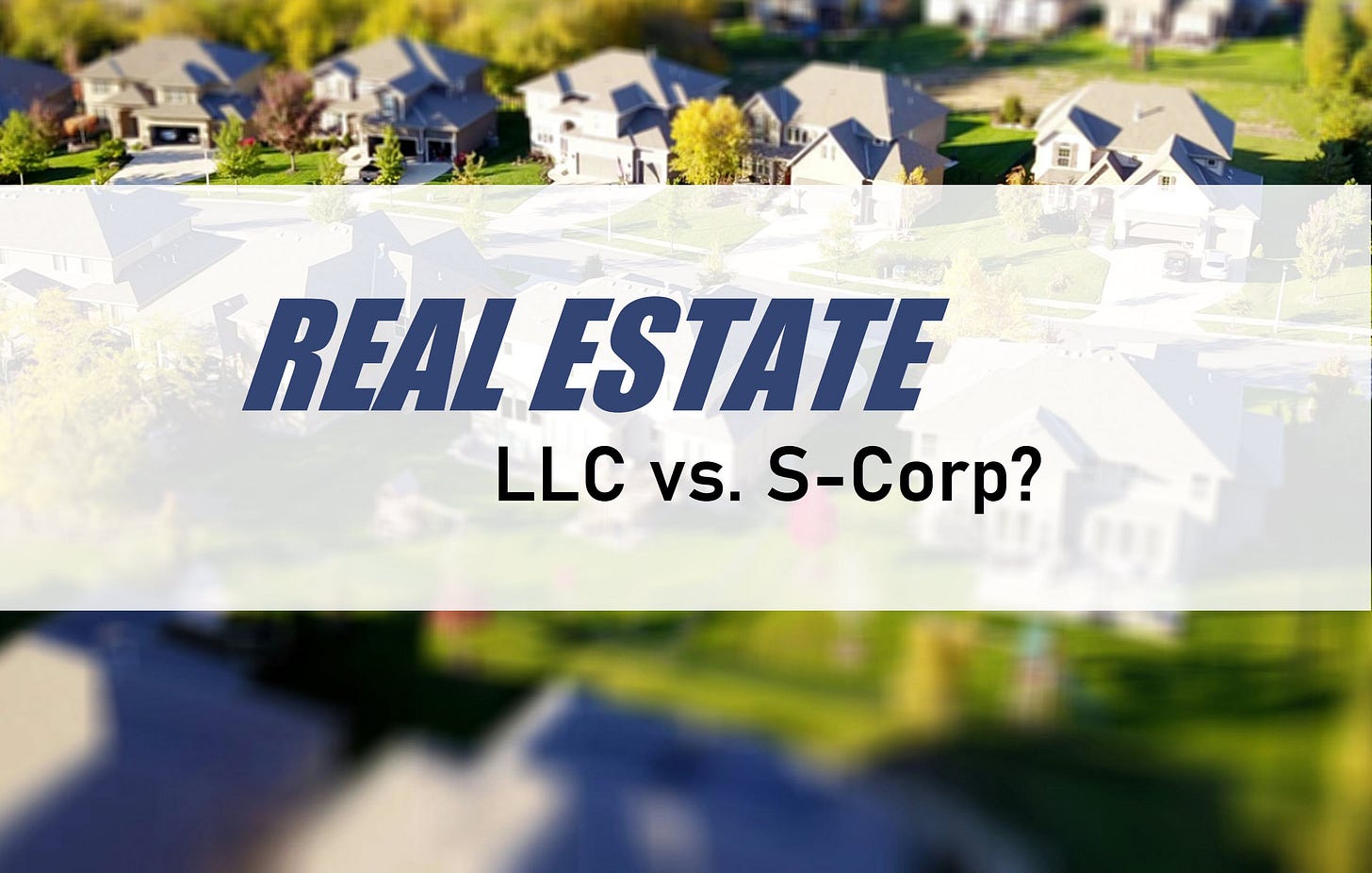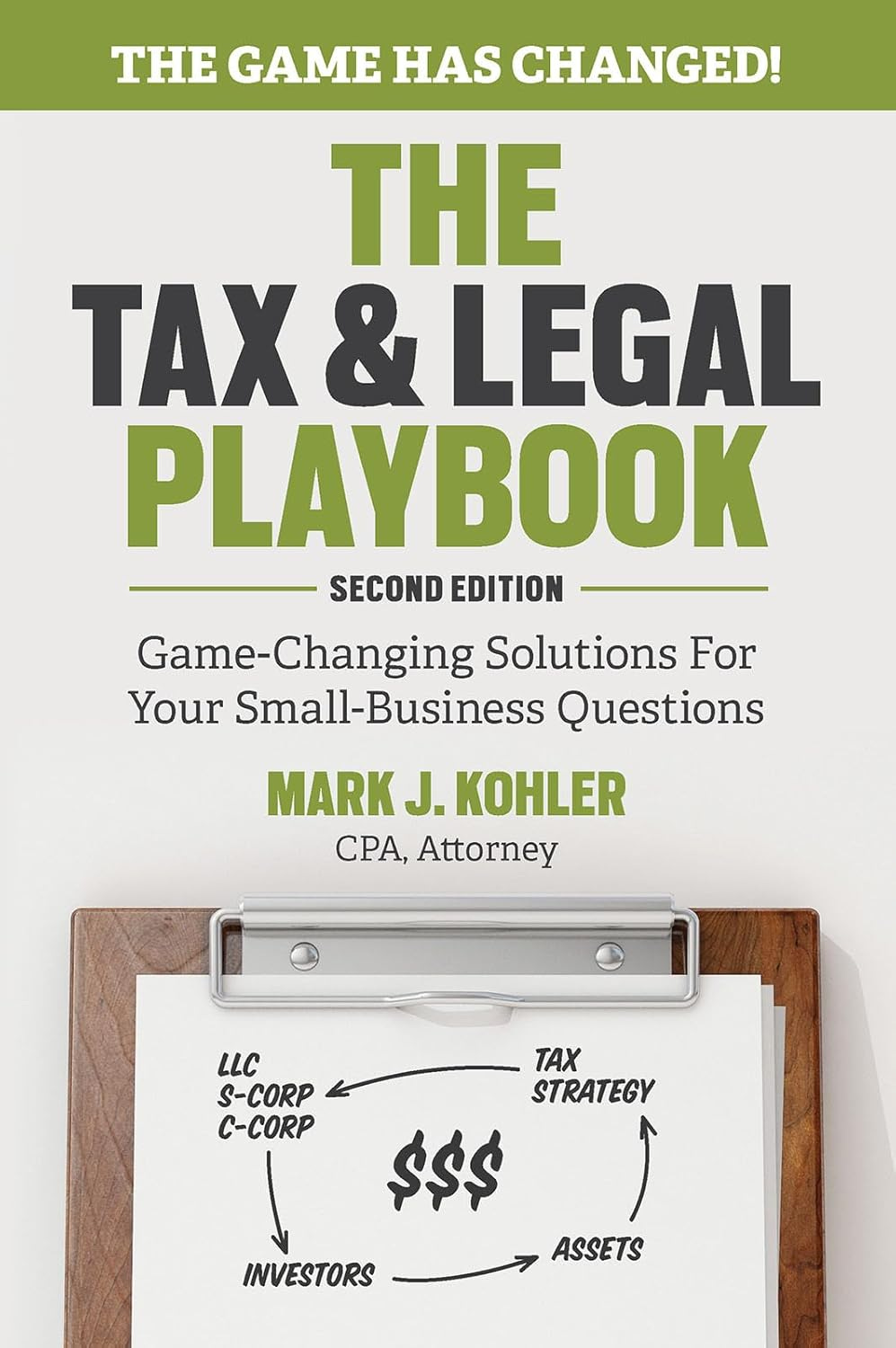Real Estate: S-Corp or LLC for Holding Companies?
Post #53: It depends on your real estate business goals.
Bootstrap Your Business is a Substack community dedicated to supporting new and aspiring business owners with the process of starting, setting up, and operating a small business.
Join me on this Journey with DIY instructional content, commonly used templates and reusable files, and coaching advice! It’s all here!
Go to my Substack Home Page for additional resources for entrepreneurs and solopreneurs: 👇
In my last newsletter about S-Corps, one of my subscribers asked a great question:
Rather than just replying in the comments, I will address this topic in more detail here so that more of my readers will benefit from the response.
📌 Caveat Emptor
I do own multiple real estate properties and was raised by a family that was almost entirely focused on real estate and property management. I have had a real estate license in Illinois (expired), and worked briefly in a real estate office in Colorado.
However, I’m not an attorney or CPA, and I do not hold any active real estate licenses.
This newsletter is partially my opinion but mostly based upon key considerations from an excellent book by Mark J. Kohler (linked below), a well-respected CPA, attorney, and real estate law expert.
If you’re weighing your options on whether to set up an LLC, S-Corp, or other business structure for your real estate business, his book is a great resource for understanding the pros and cons of different business structures for real estate.
The Tax and Legal Playbook: Game-Changing Solutions to Your Small-Business Questions
Author: Mark J. Kohler
👉 Also, be sure to check out these resources:
Bootstrap Your Business Workflow - a step-by-step guide with the links to all of the top daily posts that walk you through the process from scratch
BYB Book Recommendations - a collection of the best business books to help you on your entrepreneurial journey
BYB Alerts & News - urgent updates for self-employed and business owners - delivered to your inbox - so that you can be more prepared
BYB Documents - a repository of guidance for important business documents with instructions and guides to use them in your self-employment journey
LLC vs. S-Corp for Real Estate Businesses
Choosing the right business structure is an important decision for any small business owner, especially when real estate is involved.
Many entrepreneurs wonder whether an S-Corp or an LLC is the better option for holding property, hoping to maximize tax benefits and liability protection.
While both entities have their advantages, real estate comes with unique financial and legal considerations that often make an LLC the more practical choice.
Understanding these differences can help you make a more informed decision that aligns with your long-term business goals.

❌ 7 Reasons Why an S-Corp is NOT Ideal for Real Estate
Kohler emphasizes (and I agree, generally speaking) that S-corps are generally not the best option for holding real estate.
Here’s why:
(1) Tax Complications on Property Transfers ❌
One major drawback of using an S-Corp for real estate is the potential tax complications when transferring property.
If you place a property into an S-Corp and later need to move it — whether for refinancing, selling, or restructuring — the IRS may treat this as a taxable event, potentially triggering capital gains taxes.
In contrast, LLCs offer much more flexibility, allowing property transfers without the same tax consequences.
(2) Restrictions on Passive Income ❌
Another key consideration is how S-Corps handle income.
These entities are designed for active businesses rather than passive income streams like rental real estate.
Because of this, rental income flowing through an S-Corp can create tax inefficiencies, making it less favorable compared to an LLC, which is specifically structured to accommodate passive income without unnecessary complications.
(3) Difficulty in Taking Advantage of Real Estate Tax Benefits ❌
Additionally, real estate investors often rely on tax benefits such as depreciation deductions, 1031 exchanges, and other strategic tax advantages.
However, an S-Corp can make it more difficult to fully leverage these benefits.
Many of the tax strategies that real estate investors depend on function more smoothly within an LLC or sole proprietorship, making these structures a more practical choice for long-term property ownership.
(4) Complex Ownership Restrictions ❌
S-Corps have strict ownership rules, limiting the number of shareholders to 100 and requiring that all shareholders be U.S. citizens or residents.
Additionally, S-Corps cannot be owned by other corporations, partnerships, or many types of trusts.
This can make it difficult for real estate investors who want to structure ownership creatively, bring in partners, or pass properties down through an estate plan.
(5) Issues with Distributing Profits ❌
In an S-Corp, profits and losses must be distributed according to each shareholder's ownership percentage, which can be inflexible for real estate investments.
LLCs, on the other hand, allow for more customized profit distributions, making them a better choice for real estate partnerships where investors may want different payout structures.
(6) Self-Employment Tax Complications ❌
S-Corps are often used to reduce self-employment taxes by allowing owners to pay themselves a salary and take remaining profits as distributions.
However, rental real estate income is generally not subject to self-employment tax in the first place, making this tax-saving strategy unnecessary.
In some cases, an S-Corp could even create additional tax burdens rather than reducing them.
(7) Limited Asset Protection ❌
While both LLCs and S-Corps offer liability protection, LLCs often provide stronger safeguards for real estate investors.
With an LLC, creditors generally cannot seize ownership interests in the same way they can with an S-Corp, making LLCs a safer choice for protecting real estate assets from lawsuits or financial liabilities.
✔️ 3 Reasons Why an S-Corp Might Make Sense…
There are very few situations where an S-Corp is the ideal choice for holding real estate, but in some cases, it may offer advantages.
(1) Active Real Estate Businesses ✔️
If you are actively engaged in real estate as a business — such as flipping houses, running a real estate brokerage, or providing real estate-related services — an S-Corp could be beneficial.
These types of businesses generate earned income rather than passive rental income, which makes them more compatible with an S-Corp’s tax structure.
(2) Payroll Tax Savings ✔️
One of the main reasons business owners choose an S-Corp is to reduce self-employment taxes.
If you are running an active real estate business, such as house flipping or short-term development projects, structuring as an S-Corp allows you to take a reasonable salary while distributing remaining profits as dividends, which are not subject to self-employment tax.
However, this strategy does not apply to long-term rental properties, as rental income is typically not subject to self-employment tax in the first place.
(3) Owner-Operated Real Estate Services ✔️
Real estate professionals who actively manage properties, such as property managers or agents operating their own real estate businesses, might find an S-Corp useful.
This is because their income is derived from services rather than passive rental income, and the ability to take an owner salary can provide tax advantages.
Why an S-Corp is Rarely the Better Choice
Even in situations where an S-Corp might work, it is often not the most efficient structure.
The administrative complexity, rigid ownership rules, and potential tax pitfalls make it a less attractive option compared to an LLC for most real estate investors.
For those primarily holding rental properties, an LLC remains the preferred choice due to its flexibility, ease of management, and tax advantages.
My Opinion (and it’s just an opinion)
If you’re a small business owner considering real estate as part of your portfolio, an LLC is typically the smarter choice.
S-corps are best for active businesses generating earned income, while real estate investments often require the flexibility and tax advantages of an LLC.
But, before making a decision for yourself, consult a tax professional to ensure your structure aligns with your long-term financial goals, or consider talking with an a real estate attorney to get a more robust legal opinion.
Learn more about LLCs and S-Corps:
If you are looking for help with this topic, and you’re not sure where to start,
feel free to reach out to me directly.
Paid Subscribers are eligible for a FREE 30-minute consultation.
I still have a couple of Coaching slots open!
If you enjoyed reading this newsletter, and aren’t ready to become a subscriber, you can leave a tip. :-)
Share your thoughts in the comments if you found something useful or want to add more color to the topic.







